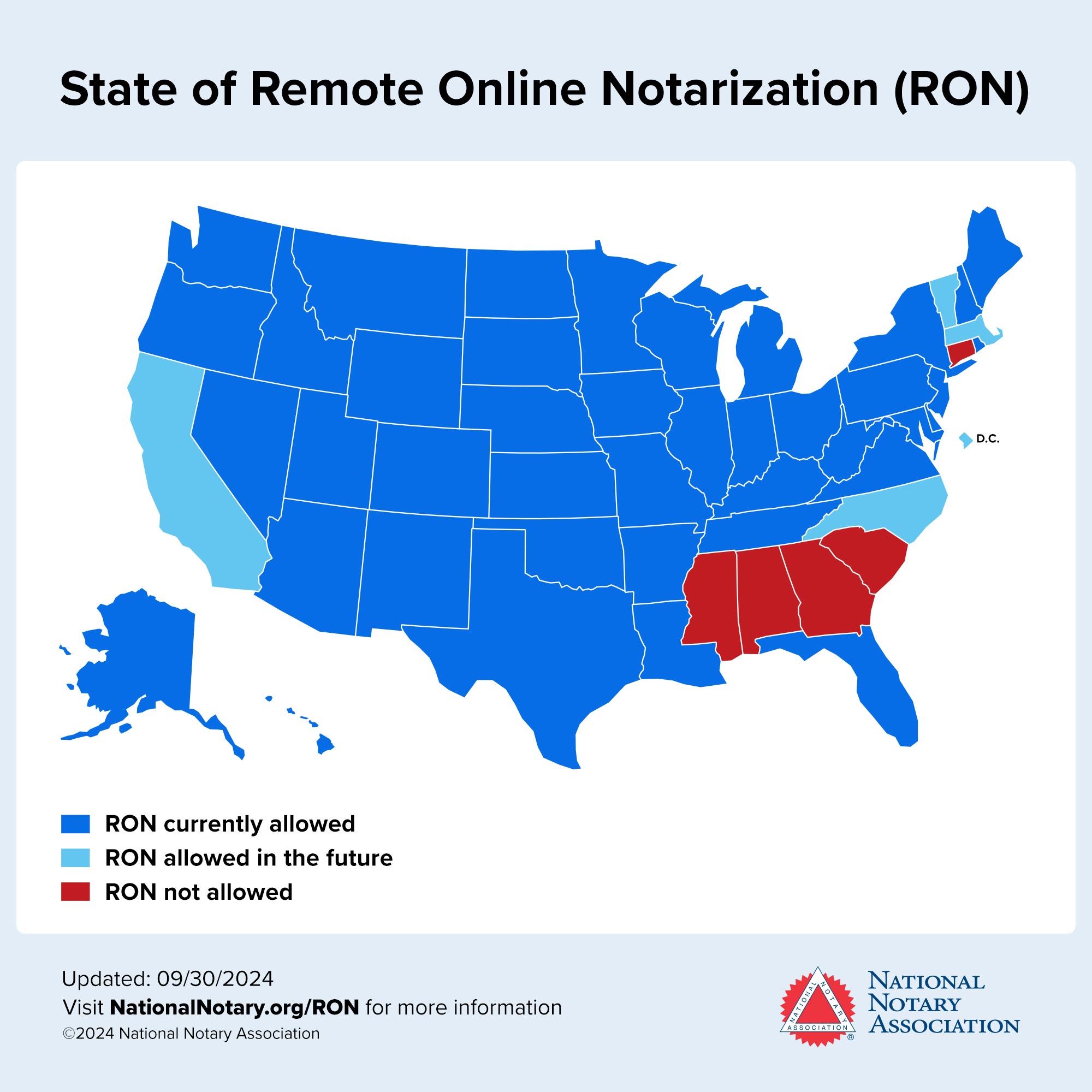A remote online Notary is a traditional Notary Public who has met the application requirements to perform remote notarizations.
Like Notaries who notarize paper documents in person, remote online Notaries are held to the same standard of impartiality when it comes to witnessing the signings of digital documents.

Traditional Notaries vs. remote online Notaries
The differences between traditional Notaries and remote online Notaries lie in their appointment location, document format and supplies.
| Traditional Notaries |
Remote Online Notaries |
| In-person location |
Online location |
| Paper documents |
Electronic documents |
| Physical seal stamp |
Electronic seal |
| Paper certificate of notarial act |
Electronic certificate of notarial act |
| "Wet"-ink signature |
Electronic signature |
About remote online notarization
A remote online notarization (RON) is the act of performing a notarization remotely using two-way audio-visual technology. It is the online equivalent of an in-person, paper-based notarization where every part of the process is done via the Internet. In addition, and in contrast to other forms of remote notarization, remote online notarization:
- Uses electronic documents, signatures and Notary seals.
- Uses a multi-factor identification process to verify the identity of a remote document signer.
- Requires the remote online Notary to make and maintain an audio-visual recording of the remote online notarization.
- Requires the remote online Notary to use technology to make the remote notarial act tamper-evident. This is usually accomplished by the remote online Notary using a digital certificate to affix the remote online Notary’s electronic signature.
Electronic notarization vs. remote online notarization
An electronic notarization is the act of notarizing a digital document in person. The difference between electronic notarizations and remote online notarizations is where the signer and Notary are located.
In an electronic notarization, the Notary and signer are in each other's physical presence. In contrast, the remote online Notary and signer are in two different locations during a remote online notarization.
How remote online notarizations work
Below are the steps on how to perform a remote notarization:
- The signer personally appears before a remote Notary in real time using audio-visual technology.
- The Notary verifies the signer's identity. In most states, traditional identity-proofing methods, such as personal knowledge or the oath of a credible witness, are allowed along with two methods unique to remote online notarizations: knowledge-based authentication (KBA) and credential analysis.
- Once the remote online Notary verifies the signer's identity, they complete the notarization with the attachment of an electronic Notary seal and a digital certificate.
- The remote online Notary collects payment and records the notarial act in their digital journal.
Where remote online notarization is allowed
Below is the current breakdown of where RON is permanently legal.

Notes:
- California enacted remote online notarization legislation, but Notaries cannot perform RONs until 2030.
- Massachusetts Notaries may not perform remote notarization because the required training and application procedures are not yet available. The Secretary of the Commonwealth published a statement advising Notaries that they cannot provide online notarization services until after they've taken training and notified their office. We will update this information when the Secretary provides further instruction.
- North Carolina has yet to put permanent its remote online notarization law into effect.
- Georgia, Mississippi and South Carolina do not authorize RONs.
- Alabama and Connecticut have enacted remote notarization laws, but they are not remote online notarization.
Benefits of being a remote online Notary
Making money, working from home and always being in demand are three of the top reasons why you should become a remote online Notary. Learn more about the benefits of online Notary work.
Remote online Notary income
Most states set $25 as the maximum fee Notaries may charge for remote notarizations. Find more information on our Notary Fees By State page.
Becoming a remote online Notary
When registering as a remote online Notary, you can expect to take a training course (if required), sign up with a state-approved RON provider, hold a surety bond (if required), and submit an application form and fee.
If you’re interested in making more money, becoming a remote online Notary is a great step forward.